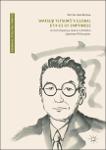



In this book, my aim is to introduce the full breadth of the ethical ideas of Watsuji Tetsurô, in a way that allows us to address key issues in sociopolitical philosophy today. Perhaps one might think that, well Watsuji was born almost 130 years ago, in a Japan that was busy trying to catch up with the western world—a context very different from our present time. That is true. But despite that, Watsuji had a very keen insight into problems that still plague us—or perhaps plague us even more—today. There are four dilemmas to which I think Watsuji can provide insight. The first question is simple—when we theorize about ethics—the kind of lives we ought to lead—where do we begin? Do we begin with the human being, the unique and singular individual? Or do we begin with the in-between—relationships? This became an issue in the debate between “ethics of justice” and “ethics of care,” as well as in the poststructural critique of totalitarian forms of ethics. A second and rather similar question is, should we think of sociopolitical life starting from individuals and their freedoms, or from the coherence of communities? This was the main issue in the liberal-communitarian debates—a question that is hardly settled today, with Brexit, Donald Trump, and Abe Shinzô reminding us that people today are not as liberal as we might have thought. Third, how do we deal with cultural difference, especially when they have to do with matters that are of ethical importance? Moral universalism and moral particularism clash with the attempt to resolve xviii INTRODUCTION this question. With Islamism, refugees in Europe, and the war over the “Islamic State” (Daesh), there is no need remind anyone that the shining ideal of cosmopolitanism is far from a decided matter. These three dilemmas bring us to a fourth, a question that lies at the heart of all ethical investigations: How do we even approach ethics? Do we start from transcendent ideals? Or do we begin from where we are now, our cultures, our everyday life?
Bản đồ thống kê
Thống kê nội dung

In this book, my aim is to introduce the full breadth of the ethical ideas of Watsuji Tetsurô, in a way that allows us to address key issues in sociopolitical philosophy today. Perhaps one might think that, well Watsuji was born almost 130 years ago, in a Japan that was busy trying to catch up with the western world—a context very different from our present time. That is true. But despite that, Watsuji had a very keen insight into problems that still plague us—or perhaps plague us even more—today. There are four dilemmas to which I think Watsuji can provide insight. The first question is simple—when we theorize about ethics—the kind of lives we ought to lead—where do we begin? Do we begin with the human being, the unique and singular individual? Or do we begin with the in-between—relationships? This became an issue in the debate between “ethics of justice” and “ethics of care,” as well as in the poststructural critique of totalitarian forms of ethics. A second and rather similar question is, should we think of sociopolitical life starting from individuals and their freedoms, or from the coherence of communities? This was the main issue in the liberal-communitarian debates—a question that is hardly settled today, with Brexit, Donald Trump, and Abe Shinzô reminding us that people today are not as liberal as we might have thought. Third, how do we deal with cultural difference, especially when they have to do with matters that are of ethical importance? Moral universalism and moral particularism clash with the attempt to resolve xviii INTRODUCTION this question. With Islamism, refugees in Europe, and the war over the “Islamic State” (Daesh), there is no need remind anyone that the shining ideal of cosmopolitanism is far from a decided matter. These three dilemmas bring us to a fourth, a question that lies at the heart of all ethical investigations: How do we even approach ethics? Do we start from transcendent ideals? Or do we begin from where we are now, our cultures, our everyday life?